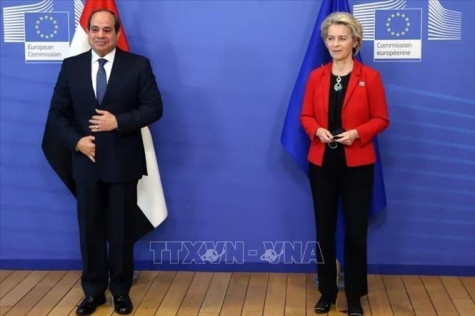Egypt-European Union Investment Conference Sparks New Era of Cooperation and Growth
The Egypt-European Union (EU) Investment Conference, which took place in Cairo on June 29 and 30, has opened new avenues for collaboration and investment between Egypt and the EU. This significant event arrives amidst pressing economic challenges for Egypt, including declining revenues from the Suez Canal and a tepid recovery in tourism due to ongoing geopolitical conflicts.
High-Stakes Gathering
The conference drew more than 1,000 delegates, including notable figures like Egyptian President Abdel Fattah El-Sisi and European Commission President Ursula von der Leyen. It is regarded as the inaugural step toward actualizing the Egypt-EU strategic and comprehensive partnership established in March 2024.
Egypt-EU Strategic Partnership
Under the theme "Unlocking Egypt’s Advantages in a Fast-Changing World," the conference aimed to spotlight Egypt’s economic potential and create a more inviting investment climate for the private sector. The agenda covered strategies to accelerate Egypt’s economic reforms, focusing on making the country an attractive destination for foreign direct investment (FDI).
The event saw the signing of multiple memorandums of cooperation in critical sectors such as industry, renewable energy, green hydrogen, and information and communication technology.
Economic Challenges and Strategic Significance
The backdrop of the conference is Egypt’s current struggle with economic difficulties. The Egyptian Central Agency for Public Mobilisation and Statistics (CAPMAS) reports that trade between Egypt and the EU hit $31.2 billion in 2023. Notably, EU investments in Egypt soared to $8.2 billion in fiscal year 2022-2023, a substantial increase from $3.2 billion the previous year.
Josep Borrell, the High Representative of the EU for Foreign Affairs and Security Policy, underlined the EU’s commitment to supporting Egypt’s reform agenda. Reflecting this commitment, the EU recently pledged €7.4 billion in financial support for Egypt’s economic reforms over the next three years.
Geopolitical Context
The conference took place during a time of heightened geopolitical tensions, particularly concerning the Middle East and North Africa. Egypt’s role in the Gaza conflict and its strategic position in the region add layers of complexity and importance to Egypt-EU relations.
The Arab Spring of 2011 led to a significant refugee crisis in Europe, an event that still reverberates throughout the continent. The current conflict between Israel and Hamas has again raised fears of a new wave of migrants. However, strong cooperation with Egypt could mitigate these concerns, as highlighted by Italian Prime Minister Giorgia Meloni, who has reiterated Egypt’s crucial role in combating illegal immigration.
Energy and Investment Prospects
Egypt is also pivotal to the EU’s energy security strategy. With its substantial natural gas production, Egypt can aid Europe in diversifying its energy sources. The conference highlighted the promise of emerging investment opportunities in green energy, technology, communications, agriculture, and logistics.
According to a World Bank report, Egypt’s economic growth forecast for the fiscal year 2023-2024 has been downgraded to 2.8%. Factors such as a 50% drop in Suez Canal revenues, attributed to escalating tensions in the Red Sea region, have compounded Egypt’s economic woes. Yet, with increased foreign investments and strong EU ties, Egypt aims to transform itself into a regional investment hub.
Looking Ahead
The Egypt-European Union Investment Conference signifies a critical juncture for both parties. For Egypt, the influx of foreign investment and the bolstering of international partnerships are imperative in navigating its current economic challenges. For the EU, solidifying ties with Egypt could offer solutions to energy security issues and migration crises. As this partnership takes its first steps, the future holds the promise of mutual growth and stability for Egypt and the European Union.
For further details, you can visit the European Commission website.
